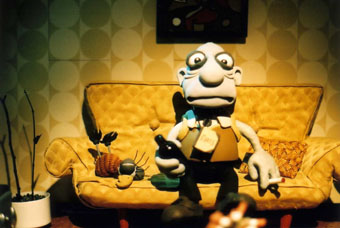 |
Adam Elliot, Harvie Krumpet, 2003 |
When I left school I really wanted to be a vet but didn’t have the qualifications, so I studied graphic design. Then I deferred and ended up hand-painting T-shirts at St Kilda market for 5 years. The lifestyle and money were great, but in the end I thought: “Is this what I’m going to do for the rest of my life?” I always liked animation, but never really aspired to being an animator; I had no idea I’d end up as a claymator. So on a whim I went to the VCA Open Day and applied to the film school; I only got in on the 2nd round after someone dropped out. I wanted to do 2D animation until my lecturers convinced me to turn Uncle into claymation.
SBS is very supportive of Australian filmmakers and have a particular affinity for animation. How did they get involved with Harvie?
SBS bought Uncle in 1997 when I graduated, and have supported all my films with presales and broadcast deals. SBS have really been my saviour and we are very lucky to have them. The AFC put a bit of money into Uncle, and fully funded Cousin and Brother in collaboration with Film Victoria. But with Harvie we went to SBS first and got a presale and an equity investment. We then went to AFC for a third of the money, and to Film Victoria for the final third.
Has knocking them dead at Annecy led to further opportunities?
At Annecy, a major distributor snapped up Harvie, after 2 or 3 were in the running. But winning mainly means we get into more film festivals: we’ll now be invited to screen as opposed to having to submit (and we’ll save a fortune in courier costs). When I first started making shorts, I thought that winning a prize meant that someone would give me a cheque to fund my next film. But it never happens like that. Even if we get nominated for an Oscar, it doesn’t really make life easier. It opens doors a little but you still have to push your way through.
You speak highly of your producer, Melanie Coombs. What’s the value of a good producer?
Melanie is everything I’m not. She’s very good at putting budgets together and predicting how much a film will cost. She supports me on every level of the process. So often a director gets all the attention, but what I do is a real partnership with Melanie. She’s been with me right from the beginning of Harvie, although she approached me back when Cousin came out. She said if I wanted to do a longer format, she’d be really interested in producing—not for any commercial reason, but purely because she’s in love with the artform.
What are you working on now?
I’m writing a claymation series called Urban Eccentrics for SBS. There are 13 5-minute episodes and each is a case study about a real urban eccentric who I’ve had to go out and find, which means I’ve met a lot of interesting people! I’m a very slow writer—I’ve done about 6 of the 13 characters–so I probably won’t finish until Christmas. And then we have to finance it. And that can take a year and we need anywhere between one and 2 million dollars to make it. It’s going to be a big task to raise the money. I’ve got some other half-hour ideas in early development. I’d love to do a trilogy of half-hours, but Melanie says that’s not economically viable! A series is a lot more consumable.
RealTime issue #57 Oct-Nov 2003 pg. 19
© Simon Sellars; for permission to reproduce apply to [email protected]








 back
back